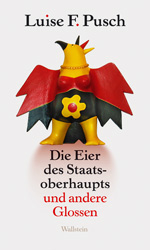
(Dame Ethel Mary Smyth)
born on April 23, 1858 in London or Kent, Great Britain
died on May 8, 1944 in Woking, Surrey, Great Britain
British composer and writer
Biography
With her loud voice and exuberant temperament, she was by no means a model of Victorian femininity. She rode and cycled, climbed mountains, played golf, tennis, chess and cricket and wrote ten books. It was the autobiography published in 1919, Impressions that Remained, that made her even more famous than any of the music she had composed.
Smyth began her formal studies of music at the Leipzig Conservatory against her parents’ wishes. She took private lessons and fell in love with her teacher's wife, the pianist Elisabeth von Herzogenberg. She wrote chamber music exclusively until 1887, a mass that made her famous in 1891, and she composed several operas as well. Among the latter, The Wreckers would be especially deserving of a performance today — during her time there was no interest in England for performing any of the works of a “woman composer.”
During the First World War, she worked near Vichy as a radiographer. To distract herself, she wrote Impressions that Remained. The autobiography is brilliantly written and still captivates readers today with its humor and openness.
In the last years of her life, she fell madly in love with Virginia Woolf, 24 years her junior and wrote to her almost daily for years. Woolf was refined and highly sensitive — the opposite of Smyth, who relished tackling hurdles, engaging in heated debates and striking up new friendships. An edition of the correspondence between the two is planned.
Smyth integrated elements from English folklore and from the entertaining genre into her compositions. Rooted in late German Romanticism, they are characterized by a solid mastery of formal crafts(wo)manship. Firmly composed within the tradition of Brahms rather than representative of the New German School that was emerging, her works display a vitality, a sense for the dramatic and an innate merriment that are all entirely and distinctively of her own creation.
A CD of her mass is finally available in stores.
(Text written in 1994 for the 50th anniversary of her death with many new publications having appeared since then, cf. Wikipedia and the MUGI link, and The Wreckers being performed starting in 2015.
Translated with DeepL.com; edited by Ramona Fararo, 2024.
Please consult the German version for additional information, pictures, sources, videos, and bibliography.)
Author: Eva Rieger
Quotes
I sip you when I feel weak. (Virginia Woolf to Ethel Smyth)
Because I have conducted my own operas and love sheep-dogs; because I generally dress in tweeds, and sometimes, at winter afternoon concerts, have even conducted in them; because I was a militant suffragette and seized a chance of beating time to »The March of the Women«' from the window of my cell in Holloway Prison with a tooth-brush; because I have written books, spoken speeches, broadcast, and don't always make sure that my hat is on straight; for these and other equally pertinent reasons, in a certain sense I am well known. (Ethel Smyth)
In England Ethel Smyth is the undisputed champion of women composers, and I hope I shall not be accused of partiality if I claim for her the crown of being the first woman composer in the whole world. (Richard Alexander Streatfeild (1913))
Ethel's new dog is dead. The truth is, no dog can stand the strain of living with Ethel. (Virginia Woolf to her friend Vita Sackville West about the composer Ethel Smyth)
I shall never forget that beautiful August day in 1877 when suddenly, like a meteor, a young and most attractive girl appeared and lit up our little circle. [...] None of us knew what to admire more about her: her extraordinary musical talent, which she demonstrated both on the piano and in singing, performing her own compositions with a particularly sympathetic voice, or her astonishing athletic skill and strength. (Georg Henschel)
If you hold the rights to one or more of the images on this page and object to its/their appearance here, please contact Fembio.



